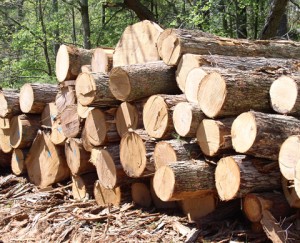America hardwood industry disintegrates from trade war with China
 A possible trade deal with China announced last week might not be broad enough to save US hardwood timber companies from layoffs, cutbacks and closings, industry representatives say.
A possible trade deal with China announced last week might not be broad enough to save US hardwood timber companies from layoffs, cutbacks and closings, industry representatives say.
Chinese tariffs slapped on exports of red oak, walnut and other hardwoods have cut almost 50 per cent of the revenue in the industry since 2017, according to the American Hardwood Export Council. Lumber companies have responded by closing sawmills and eliminating shifts.
“When China slapped a 25 per cent tariff rate on red oak logs and lumber, it cratered the price producers can get for red oak. That’s a huge chunk of demand that’s disappeared,” said Tripp Pryor, the council’s spokesman. “This drop is larger than if all of Europe and all of Southeast Asia just quit buying US hardwoods overnight.”
Tacoma, Wash.-based Northwest Hardwoods will close its Mount Vernon, Wash., and Maury River, Va., mills in November, laying off 100 employees, the largest US hardwood supplier said.
The decision was made “as prospects dimmed for a quick resolution to the US and China trade dispute,” the company said in a statement.
The hardwood industry employs about two million people in the United States, according to the Hardwood Federation. Hardwood sawmills usually are family-owned and situated near timber forests in the Northeast, South and Pacific Northwest.
Hardwoods exported from the United States include ash, beech, birch, cherry, hickory, maple, red oak and walnut. Hardwoods are used for flooring, furniture, cabinets, doors and decorative trim.
Tariffs have been like a “buzz saw” through Appalachian hardwood businesses and the families who own and operate them, Frank Stewart, executive director of the West Virginia Forestry Association, wrote in an opinion piece sent to various publications.
“There is no other market to absorb 32,025 shipping containers of American red oak that sold to China in 2017. The tariffs have taken all profits from U.S. hardwood exports to China,” he wrote. “It will drive mills out of business this year, losing jobs and outlets for landowners to sell their timber.”
Since the United States’ trade war with China, the value of exports of US hardwood lumber dropped by almost 57 per cent to $54 million in August, from $124.8 million in August 2017, according to the export council. All lumber exports to China fell by $615 million compared to the previous year.
Even if the trade dispute is close to resolution, as the White House announced Friday, the damage might be done, the council’s Pryor said.
Buyers in China are turning to Russian birch and aspen providers, as well as West African illegal exports of endangered kevazingo wood from Gabon, which leads to extreme harvesting deforestation, Pryor said.
“Once [buyers] have those sources of hardwoods, they will be awfully hard to get back,” he said. The US hardwood industry buys timber from private landowners and practices “sustainable forestry” Pryor said.
In 2018, after soybeans, hardwood lumber was the largest export product to China by value.
But when the US Department of Agriculture passed an emergency $1.6 billion trade aid package, hardwood producers had to share a meager $5 million, for promotional use only, with producers of softwoods and plywood.
Multigeneration family hardwood companies in New England are feeling the pain, said US Rep. Annie Kuster, D-N.H. The trade dispute is “ravaging this industry,” endangering the livelihood of mill workers, craftsmen, loggers and foresters, Kuster said in July in a letter urging more support from the USDA co-signed by 37 other members of Congress.
Tariffs and the damage to hardwood companies are hotly discussed topics at monthly meetings of the 50-year-old Los Angeles Hardwood Lumberman’s Club, said Stephen Ondich, CEO of Commercial Forest Products, a hardwood distribution company.
“If you’re a mill that strongly depends on Chinese purchases, you’re really sweating bullets right now. There’s no other market that will pick up the slack for what the Chinese are not buying,” Ondich said.
He added: “The most troubling thing is the loss of infrastructure. When sawmills close down, the loggers go into other industries and they’re not going to come back.”
Source: GNA
